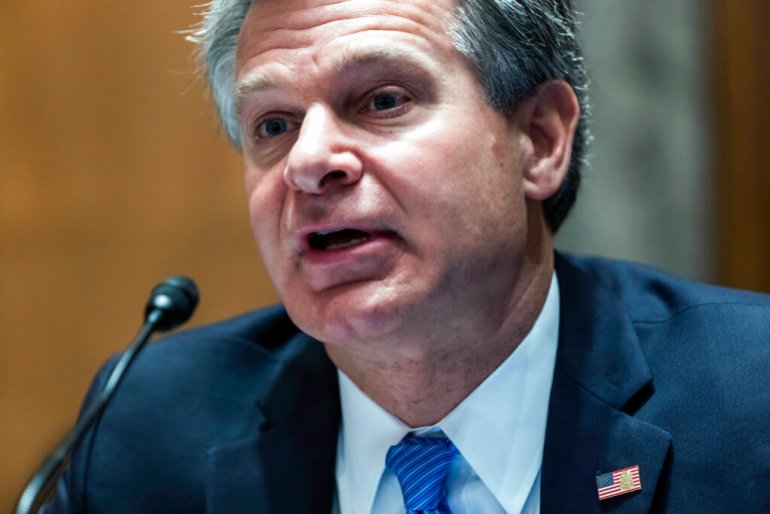US officials fear al-Qaeda threat after fall of Kabul to Taliban
In wake of chaotic US withdrawal, US intelligence agencies are watching to see if al-Qaeda and ISKP gain.

Top United States security officials are concerned about the potential threat to the US from al-Qaeda following the withdrawal of US troops from Afghanistan.
Christine Abizaid, director of the US National Counterterrorism Center, told a Senate committee on Tuesday that US intelligence agencies are re-assessing rapidly developing threats from fighter groups in Afghanistan.
Keep reading
list of 4 itemsTrying to heal Afghanistan without international aid
Second Dutch minister resigns over Afghanistan evacuation scandal
Taliban surrounds Panjshir Valley as resistance holds
“Afghanistan is a very dynamic environment right now,” Abizaid told the Senate Homeland Security Committee.
Abizaid’s agency, created by Congress in the years after the September 11 al-Qaeda attacks, is responsible for assembling information from across all US spy agencies about potential threats to the US from Al Qaeda and groups like the Islamic State in Khorasan Province, ISKP (ISIS-K).
“It is fair to assess that the development of those groups’ external operations capability … we’ve got to monitor and assess whether that’s going to happen faster than we had predicted otherwise,” Abizaid told senators.
Prior to the US military withdrawal, the CIA and Defense Intelligence Agency had previously warned US policymakers that al-Qaeda would be able to reconstitute in Afghanistan within one to three years.
“Threat from Afghanistan is the top of our priority in terms of what that dynamic landscape is likely to present,” Abizaid said.
FBI Director Christopher Wray told the Senate that FBI officials share the concern about the possibility of al-Qaeda regaining a “safe haven” in Afghanistan and ISKP being able to “operate more freely”.
“We are concerned about what the future holds,” Wray said.

FBI agents are concerned about “events in Afghanistan serving as some kind of catalyst or inspiration for terrorist attacks elsewhere in the region,” Wray said.
Among the FBI’s concerns Wray said, was the Taliban’s appointment of leaders affiliated with the Haqqani Network to government positions.
Sirajuddin Haqqani, son of the founder of the Haqqani Network, has been named as interior minister. Khalil-ur-Rahman Haqqani, a leader of the Haqqani group, was named minister for refugees in the Taliban’s new caretaker government.
Sirajuddin Haqqani is on the FBI’s “Most Wanted” list in connection to a 2008 bombing of a hotel in Kabul. The US has offered $10m for information leading to his capture and arrest.
“The way we left Afghanistan in a chaotic rushed way” has created an “enhanced threat”, said Senator Rob Portman, a Republican.
“We ended the longest war, but in another way, we’ve made things more dangerous,” Portman said.

Taliban fighters facing little resistance swept through the country in August. The Taliban formed a new government after the Western-backed government in Kabul collapsed when former President Ashraf Ghani fled on August 15.
The US was forced to hurriedly close its embassy and mount an emergency evacuation of tens of thousands of US citizens and Afghan civilians who feared Taliban retribution.
“As I watched the effort to try to get 125,000 people out of Afghanistan … I was reminded of what happened in Vietnam,” said Senator Tom Carper, a Democrat, referring to the fall of Saigon in 1975 when US forces withdrew after a failed war.
“I said to myself, ‘This may not end well,’ and it didn’t,” Carper said.
In justifying the US withdrawal, President Joe Biden and top administration officials had assured Congress that the US military and spy agencies would be able to detect threats re-emerging from Afghanistan and respond with “over-the-horizon” capabilities.
But new doubts have arisen among lawmakers about Pentagon capabilities following a botched drone raid on a suspected ISKP operative in Kabul that killed 10 Afghan civilians on August 29. Pentagon officials acknowledged on September 17 the attack was a “horrible mistake”.
Portman called the drone attack “feckless” and “tragic”.
More than 700 Afghan civilians had been killed in US air raids in 2019 after the US military relaxed its criteria for authorising air raids, according to the Costs of War Project at Brown University.
Overall, an estimated 47,000 Afghan civilians were killed in the 20-year US war in Afghanistan that began after the September 11 attacks, according to the Costs of War Project.
Al-Qaeda and ISKP had been “relegated to primarily a regional threat”, during the US occupation of Afghanistan, Abizaid said.
But in the wake of the chaotic US withdrawal, US intelligence agencies are watching to see if that regional threat “build to a capability and intent that is focused externally and particularly focused on the homeland”, Abizaid said.
The ISIL (ISIS) group and its affiliates continue to maintain “a strategic interest in conducting attacks in the West”, Abizaid said.
ISKP took credit for a suicide bombing at the Kabul airport on August 26 that killed at least 175 Afghans and 13 US service members who had been helping evacuate Afghans.